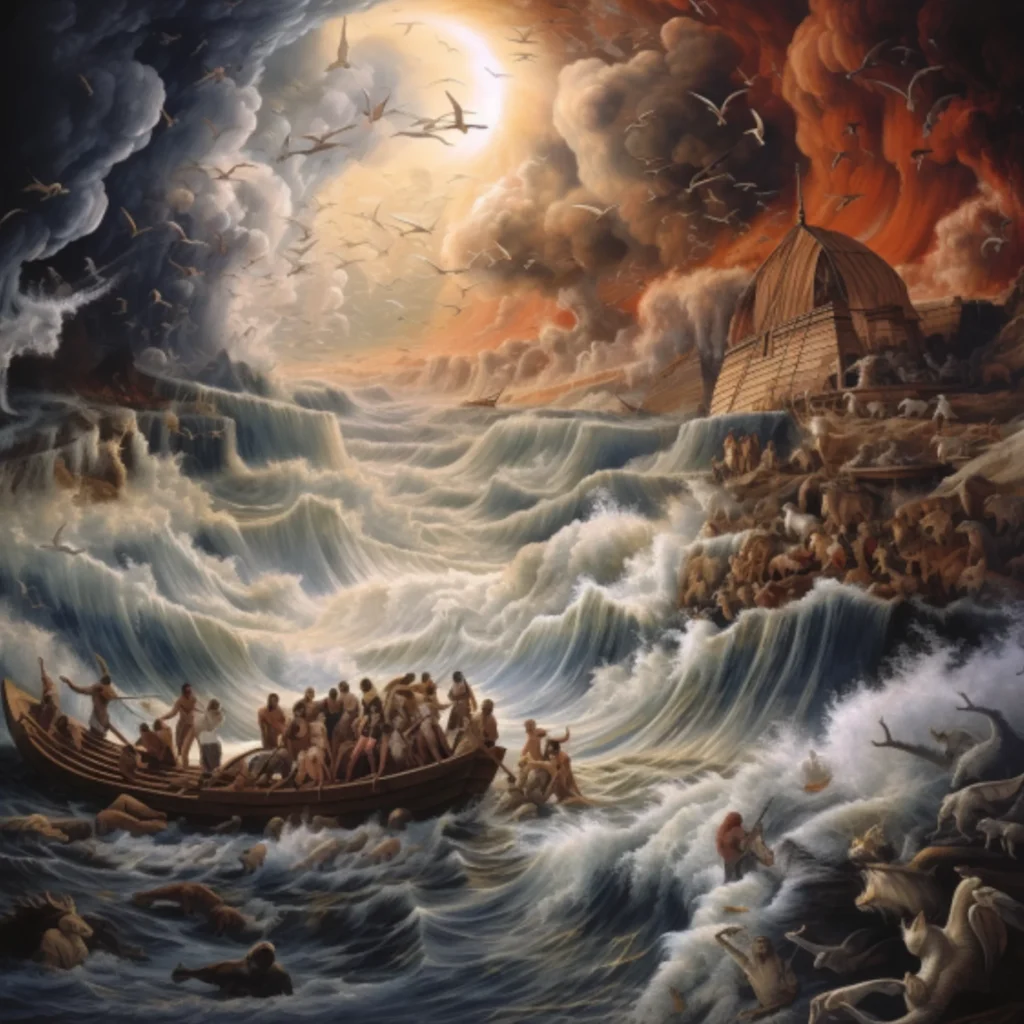Ancient flood myths continue to ripple through our spiritual imagination.
Across time and cultures, flood myths from around the world have riddled sacred texts, oral traditions, and poems; each echoing the same message, destruction and renewal or chaos and cosmic order.
The Great Flood, also known as the Great Deluge, is not just a tale of watery ruin, but a mirror to the spiritual state of humanity.
What makes the flood myths from around the world so endearing?
Perhaps it is their ability to speak to the human condition by targeting our flaws, our hopes, and our relationship with the divine. Let us explore these sacred narratives, not just as flood myths, but also as a reflection of our inner world.
The great flood is not just about water, but about wisdom, cleansing, and the rhythm of endings and beginnings.
Mesopotamian Flood Myth
The Epic of Gilgamesh is an ancient Mesopotamian flood myth that dates back to around 2100 BCE. It is also the oldest written story we know of in all of human history. It tells the story of Utnapishtim, who was warned by the Gods of an impending flood and built a massive boat to survive the deluge along with his family, animals, and craftsmen. This story of the Great Deluge is a symbol of early human understanding of divine justice, impermanence, and the sacred trust between humans and the divine.
“Ever the river has risen and brought us the flood, the mayfly floating on the water. On the face of the sun, its countenance gazes, then all of a sudden, nothing is there!”
– The Epic of Gilgamesh, an ancient Mesopotamian text
The Great Flood in the Bible
The Great Flood Bible account is also known as the story of Noah’s Ark. The story of Noah’s Ark is a well-known flood myth from the Hebrew Bible, which remains central for the 3 Abrahamic traditions of Judaism, Christianity, and Islam.
According to the story, God decided to flood the Earth to cleanse it of wickedness, and Noah was instructed to build an ark to save himself, his family, and pairs of all animals from the floodwaters, as Noah was deemed to be the only righteous man left on Earth.
“The LORD then said to Noah, ‘Go into the ark, you and your whole family, because I have found you righteous in this generation. Take with you seven of every kind of clean animal, a male, and its mate, and two of every kind of unclean animal, a male, and its mate, and also seven of every kind of bird, male, and female, to keep their various kinds alive throughout the earth. Seven days from now, I will send rain on the earth for forty days and forty nights, and I will wipe from the face of the earth every living creature I have made.’ And Noah did all that the LORD commanded him.”
– The Hebrew Bible (Genesis 7:1-5)
Hindu Flood Myth
In the Hindu flood myth, Vishnu assumes the form of a horned fish to guide Manu, the first human, and a few selected animals from a great deluge, eventually leading to the regeneration of life on Earth. This story about the Hindu Great Flood is given in the Matsya Purana, an ancient Hindu scripture.
“O kind-hearted man, you have care in your heart, listen now. Soon, the world will be submerged by a great flood, and everything will perish. You must build a strong ark and take a long rope on board. You must also take with you the Seven Sages, who have existed since the beginning of time, and seeds of all things and a pair of each animal. When you are ready, I will come to you as a fish, and I will have horns on my head. Do not forget my words, without me, you cannot escape from the flood.”
– Matsya Purana, Hindu text
The Great Deluge Myths from Around the World
Ancient GreeceThe Ancient Greek flood myth involves a couple known as Deucalion and Pyrrha, who survived the flood caused by Zeus by building an ark and landing it on a mountain. They were then told by the god Hermes to throw stones behind them, which turned into the new men and women who would repopulate the Earth.

Native AmericanVarious Native American tribes have flood myths, like that of the Hopi tribe of North America, which tells the story of a great deluge that destroyed the world. The only survivor was a man named Waynaboozhoo who had made a raft of logs and sticks for himself and other animals, and decided he would help rebuild the world.
ChineseThe Chinese flood myth, found in ancient texts like the Classic of Mountains and Seas, tells the story of a catastrophic flood that covered the Earth and was only stopped when the hero Yu, with the help of divine intervention, constructed massive flood-control projects to save the people and the land.
Related reads
False narratives | Charioteer | Sacred words | Religious wear | Cosmic Tree | Beyond Happiness | Tree of life | Sacred music | Fire as a symbol |
For more reflections on personal growth, wisdom and happiness, browse through our website.


